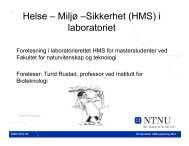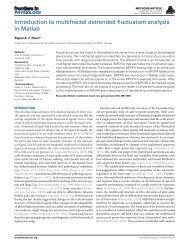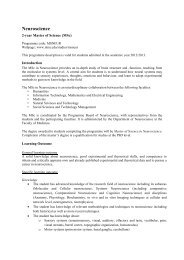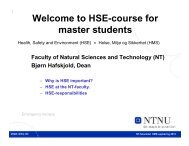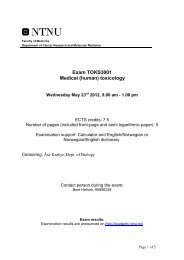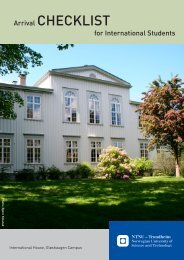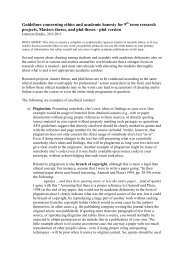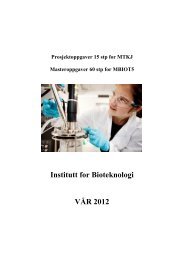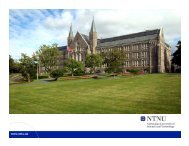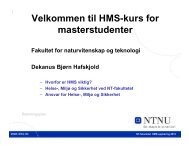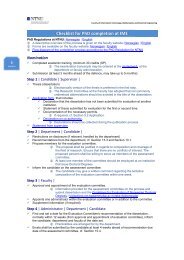Annual Report 2011 - NTNU
Annual Report 2011 - NTNU
Annual Report 2011 - NTNU
You also want an ePaper? Increase the reach of your titles
YUMPU automatically turns print PDFs into web optimized ePapers that Google loves.
JULY—OCTOBER <strong>2011</strong> <strong>NTNU</strong> GLOBAL PAGE 6<br />
Latest Globalization-<br />
Publications<br />
de Soysa, I. (<strong>2011</strong>). The hidden hand wrestles<br />
rebellion: theory and evidence on how<br />
economic freedom prevents civil violence.<br />
Studies in Ethnicity and Nationalism, 11(2):<br />
285–297.<br />
Lund, R., Khasalamwa, S. and Tete, S. Y.A.<br />
(<strong>2011</strong>). Beyond the knowledge-action gap:<br />
Challenges of implementing humanitarian<br />
policies in Ghana and Uganda. Norwegian<br />
Journal of Geography 65(2): 63–74.<br />
Moses, J. (<strong>2011</strong>). Migration in Europe. In Migration<br />
today. 4th edition. New York: Rowman<br />
and Littlefield: 371–397.<br />
Golebiowska, K., Valenta, M. and Carter, T.<br />
(<strong>2011</strong>). "International immigration trends<br />
and data", in Dean Carson et. al (ed.).<br />
Demography at the Edge: Remote Human Populations<br />
in Developed Nations. Ashgate. 53–84.<br />
Ashgate <strong>2011</strong> (ISBN 978-0-7546-7867-0)<br />
31 s. International population studies.<br />
Valenta, M. and Ramet, S. (ed.) (<strong>2011</strong>). Bosnian<br />
Diaspora: Integration in transnational communities.<br />
Ashgate.<br />
The Bosnian Diaspora: Integration in<br />
Transnational Communities provides a<br />
comprehensive insight into the situation of<br />
the Bosnian Diaspora, including not only<br />
experiences in 'western' countries, but also<br />
the integration experiences of Bosnian migrants<br />
in neighbouring territories, such as<br />
Croatia, Serbia and Slovenia.<br />
The book presents the latest trans-national<br />
comparative studies drawn from the US and<br />
Australia as well as countries across Europe,<br />
to explore post-crisis interactions among<br />
Bosnians and the impact of post-conflict<br />
related migration. Examining the common<br />
features of the Diaspora, including the responses<br />
of migrants to changes within Bosnia and the position of displaced<br />
people in both Bosnian society itself and local political discourses, this volume<br />
addresses the influence of global anti-Muslim rhetoric on the Bosnian Diaspora's<br />
self-identification and refugees' relationships to their home country. The<br />
extent to which refugees and returnees can be described as agents of globalization<br />
and social change is also considered, whilst addressing the issue of Bosnian<br />
integration into various receiving countries and the influence exercised<br />
by European reception policies on receiving nations outside Europe.<br />
PhD Course: Deliberating Controversies<br />
in Globalization Theory,<br />
Methodology and Ethics<br />
The <strong>NTNU</strong> Globalization Research Program<br />
conducted its first intensive PhD<br />
Course last September 5 to 16, <strong>2011</strong>. It<br />
was attended by PhD candidates from<br />
three Norwegian universities: Trømso,<br />
Bergen and Trondheim (<strong>NTNU</strong>). With<br />
the theme 'Deliberating Controversies in<br />
Globalization Theory, Methodology and<br />
Ethics' the PhD Course started with a<br />
twin-lecture on approaches to social research<br />
and pre-history of globalization<br />
given by Torbjørn Knutsen of <strong>NTNU</strong><br />
Department of Sociology and Political<br />
Science. The second day was devoted to<br />
a series of four lectures given by University<br />
of Warwick Professor Jan Aart<br />
Scholte on defining, explaining, assessing<br />
and enacting globalization. Two lectures<br />
on quantitative research on globalization<br />
were given on the third day. The first<br />
lecture was given by the Director of<br />
<strong>NTNU</strong>’s Globalization programme Indra<br />
de Soysa.<br />
This was followed by Tanja Ellingsen of<br />
the Department of Sociology and Political<br />
Science giving a lecture on quantitative<br />
and theoretical approaches to globalization,<br />
culture and conflict. For the<br />
fourth and fifth day, a series of three<br />
lectures on global justice were given by<br />
Thomas Pogge of Yale University. Two<br />
philosophers from Stockholm University-<br />
-Torbjörn Tännsjö and Gustaf Arrhenius<br />
--gave a series of lectures on global democracy<br />
and the democratic boundary<br />
problem respectively on the sixth and<br />
seventh day of the course. On the eight<br />
day, Ulrika Mårtensson of <strong>NTNU</strong> Department<br />
of Archaeology and Religious<br />
Studies gave two lectures on democracy<br />
and Islamic fundamentalism which was<br />
followed by a lecture on global online<br />
communication against fundamentalist<br />
knowledge given by course leader/<br />
organizer May Thorseth of <strong>NTNU</strong> Philosophy<br />
Department, Applied Ethics<br />
Program and Intercultural Dynamics<br />
Globalization Focus Area. The final day<br />
of the course Ruth Macklin of Albert<br />
Einstein School of Medicine in New<br />
York gave a lecture on general obligations<br />
in conducting international research<br />
followed by a workshop on deception<br />
and withholding information in social<br />
research which Ruth conducted with<br />
Allen Alvarez who also co-organized the<br />
PhD Course. More details can be viewed<br />
by visiting the course webpages at http://<br />
folk.ntnu.no/allena/glob.<br />
Professor Thomas Pogge maps out the relations<br />
between global institutional arrangements,<br />
governments of the most powerful<br />
countries, corporations and citizens



